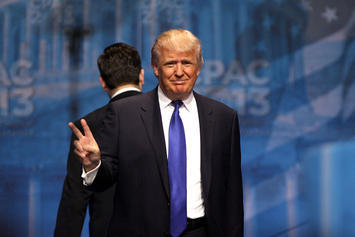
Whether he loses or, more unlikely, wins, Donald Trump creates an existential crisis for the Republican Party. The New York poseur has effectively undermined the party orthodoxy on defense, trade and economics, policies which have been dominant for the last half century within the party but now are falling rapidly out of fashion among the rank and file.
In this sense, Trump’s nomination could be seen as both an albatross and something of a life preserver. His rallying of a large working-class base, particularly in the Heartland, provides a potential new direction for the party that has lost irretrievably the business elite, the coastal states, minorities and the educated young. Clearly, the party needs to revise its electoral strategy.
Geography and economics
Trump’s raw and poorly considered economic nationalism positions the GOP against Hillary Clinton’s crony corporate establishment — anchored by Wall Street, Silicon Valley and the coastal media. This resonates broadly among many Americans, who are increasingly disaffected with the oligarch-dominated, big-bank-driven economy.
Now the Democrats have become the party of the urban gentry, public employees and the government-dependent poor, an identification that hurts them elsewhere.In contrast, Trump’s strongest support comes from small towns and, to a lesser extent, the suburbs. In these geographic heartlands, low labor participation rates, declining incomes, struggling Main Street businesses and collapsing opportunity incite resentment and a call for radical change. The disconnect with the power centers is further stoked by the celebratory coverage received by the asset/inflation-driven “false economy.”
Clearly, the traditional Republican path to victory — pandering to the ultrarich — seems misplaced, if not a trifle masochistic. Trump may boast about how he benefited from cronyism, but his critiques resonate more with the owner of a bar on a small town Main Street or a 20-person machine shop who knows that he can’t count on the Treasury Department defending his tax avoidance, as has occurred in the case of big-time Democratic donor Apple.
Similarly, Trump’s crude assault on undocumented immigration makes more sense to many lower-skilled Americans who compete with them for jobs. Additionally, Trump’s attack on the Democrats’ ever more strident decarbonization drive has brought Appalachia firmly into the GOP realm, and may also deliver some key Midwestern swing states, such as Iowa and Ohio.
Bill Clinton, who once effectively reached such voters, now denounces the “coal people” like they are a bunch of mindless Bubbas. His wife’s recent attack on Trump supporters as homophobes, racists and xenophobes revealed an unflattering glimpse at the inner thoughts of the “party of the people.”
Read the entire piece at The Orange County Register.
Joel Kotkin is executive editor of NewGeography.com. He is the Roger Hobbs Distinguished Fellow in Urban Studies at Chapman University and executive director of the Houston-based Center for Opportunity Urbanism. His newest book, The Human City: Urbanism for the rest of us, will be published in April by Agate. He is also author of The New Class Conflict, The City: A Global History, and The Next Hundred Million: America in 2050. He lives in Orange County, CA.
Photo by Gage Skidmore from Peoria, AZ, United States of America (Donald Trump) [CC BY-SA 2.0], via Wikimedia Commons













"Trump’s shameless,
"Trump’s shameless, needlessly provocative antics clearly appeal to those with residual racist and nativist sentiments, which undermine GOP efforts to break into the increasingly racially diverse electorate."
I think Joel is simply wrong about both halves of this sentence. I predict Trump will do surprisingly well with working-class and would-be working-class blacks and Hispanics and that his working-class white supporters will be perfectly fine with it. We'll see soon.
Luke Lea